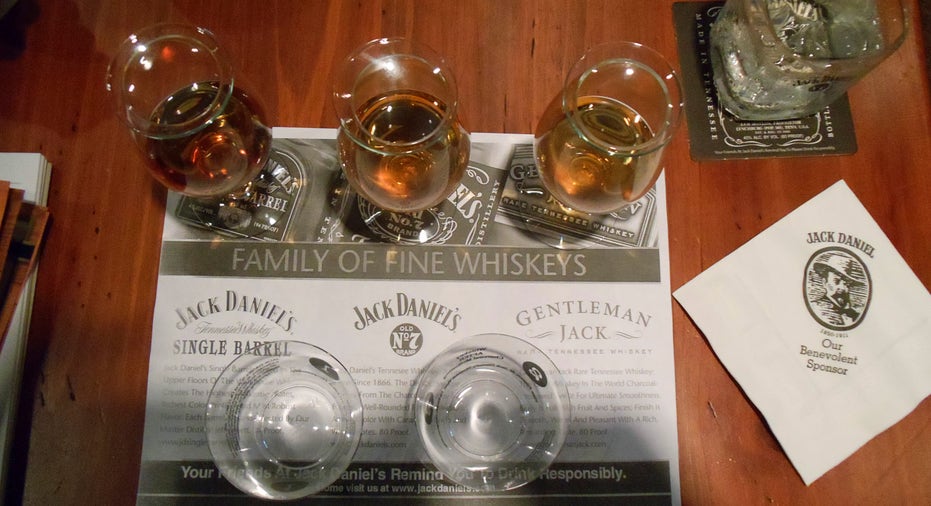Small Distillers Split on Jack Daniel’s Tenn. Whiskey Law

A one-year-old law narrowly defining “Tennessee whiskey" is leaving a bad taste in the mouth of some of the state’s distillers. The new legislation requires all Tennessee whiskey to be fermented from a mash containing at least 51% corn, filtered through maple charcoal and aged in new oak barrels. This describes pretty much to a tee Jack Daniel’s own whiskey-making process, which is no coincidence, given that Jack Daniel’s parent company Brown-Forman had a hand in drafting the bill, according to Tennessee state Rep. Bill Sanderson. “Now, everybody is saying, ‘We have this problem with this narrow definition,’” says Sanderson. “We don’t want to put a hardship on anyone.” One Tennessee business owner says the young law hurts small distillers. “That law stifles creativity. It puts all of us in one box that says if we’re going to make whiskey, it has to be made a process developed by Jack Daniel’s,” says Phil Prichard, president and founder of Prichard’s. But Jack Daniel’s master distiller Jeff Arnett says the new law shouldn't stifle competition or enforce conformity. He views the legislation in the same light as laws regulating bottles labeled as Kentucky bourbon, Scotch whiskey or Champagne. “It’s a premium process, like bourbon, and there needs to be a truth in labeling that keeps people honest in their process,” says Arnett. He says Jack Daniel’s, which lobbied for the legislation, wanted to ensure that “Tennessee whiskey” continued to connote a high level of quality to drinkers around the world – and stand up to other types of liquors, including Scotch. “It’s not about suppressing competition. It’s about being able to compete on a global scale,” says Arnett.
But not all distillers in Tennessee see eye-to-eye on the value of this narrow definition. Leading the fight against the Tennessee law is the Diageo-owned George Dickel brand – another Goliath, but one which says it is fighting on behalf of the little guys in the Tennessee whiskey industry. While George Dickel actually produces its whiskey in compliance with the law, a Diageo spokesperson says the company is against any law that hurts competition or innovation.The Fight Against Jack Daniel’s Definition Tennessee state Rep. Bill Sanderson says the new law doesn’t represent the pro-business, small-government attitude of his home state. “We want to open it back up. We are still going to define Tennessee whiskey, but not as narrowly as Jack Daniel’s would like us to,” says Sanderson. Sanderson says the emphasis on new oak barrels, which can cost hundreds of dollars apiece, hurts small distillers. Oak barrels are in high demand around the world, but Jack Daniel’s manufactures its own, which Rep. Sanderson says already gives the company a huge competitive advantage. “They are a big bully picking on all the little guys,” says Sanderson. In the small town of Kelso, Prichard is supporting the Diageo/George Dickel argument. He was the only small distiller to argue against the Jack Daniel’s legislation when it was introduced last year, earning him an exemption to the law. Prichard says five generations ago, his family started making whiskey in Davidson County, Tennessee. Inspired by that recipe, Prichard started making whiskey in 20013 – without using the charcoal filtering process the Jack Daniel’s legislation says is mandatory. “We opted to make more of what I deemed a traditional whiskey,” says Prichard, who says his recipe harks back to the 1820s. But without the exemption he was granted, Prichard says he would not be able to call his product “Tennessee whiskey.” While his business hasn’t been affected by the law, Prichard says he is continuing to fight against the narrow definition on behalf of all small distillers.
“We won the battle last year, but we didn’t win the war. Jack Daniel’s won,” says Prichard.Definition Helping Small Distillers? But other small whiskey-makers say Jack Daniel’s has the right idea – and a strong Tennessee whiskey brand helps the little guys as well. Entrepreneur Eric Wilson of whiskey startup Rocky Top Distillery says he would never have launched his company were it not for the strong brand behind Tennessee whiskey. Rocky Top Distillery was formed last year, and will begin selling its own Tennessee whiskey within the next six months. “The current law is similar to the Kentucky bourbon law, and both are exploding overseas with exports. Jack Daniel’s, when they were small, surely faced the same dilemma of, ‘Are we going to reuse barrels?’ And they could have chosen the cheap path,” says Wilson. “I wouldn’t be considering making Tennessee whiskey if it didn’t have the name it did today thanks to Jack Daniel’s.” Small distiller Darek Bell, owner of Corsair, agrees with Wilson – and calls into question the motivation of Diageo. He says Corsair produces whiskey in compliance with the law. “Diageo says it would help craft distillers, but I’m not sure how that would be the case. A big company like that doesn’t need to speak on behalf of craft distilling – we support those definitions,” says Bell. He says Corsair is sold in eight countries internationally, and has been buoyed by drinkers’ affinity for the Jack Daniel’s brand. “Using depleted barrels? I don’t understand why you would want that,” says Bell.



















